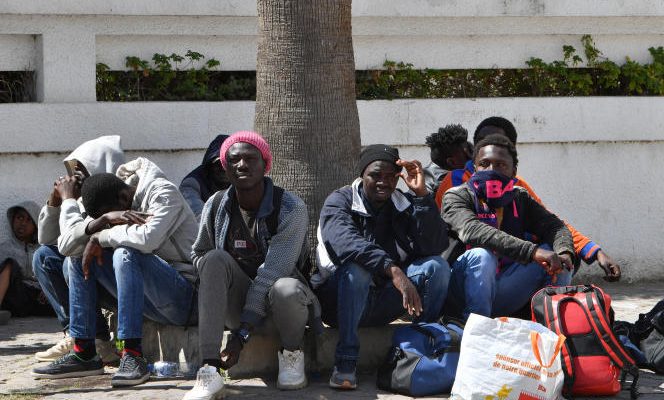Nothing remains of the sit-in installed on March 21 in front of the United Nations High Commissioner for Refugees (UNHCR) in Tunis. On Tuesday 11 April, the occupants, mostly asylum seekers and refugees who were claiming their “evacuation” to a safer country than Tunisia, were deported manu militari by law enforcement. Mattresses and blankets were taken away by road officials. An operation “ hyperviolent”according to Alia*, a Nigerian still in shock: “They took everything, all our belongings, even my phone. They also seized an envelope containing the money my family had sent to me from my country. »
The group of several dozen people – women, men and sometimes very young children – was made up of Sudanese, South Sudanese and Eritrean nationals, among others. They fled their countries due to conflicts and therefore could not appeal to their embassies to be repatriated, as they face serious threats.
Alia, her husband and the others moved in front of the headquarters of the International Organization for Migration (IOM), located a few hundred meters from the UNHCR. In this pedestrian alley, nearly 200 people have been camping on the ground, in precarious conditions, since President Kaïs Saïed’s speech on the “ hordes of illegal immigrants, February 21, sparked an unprecedented wave of violence, arrests and deportations against black people.
The exiles are calling for humanitarian aid from international organisations. “We didn’t have much, but now we have nothing left”, laments Alia. The Berges du Lac business district, home to diplomatic representations and international organizations – including the two UN agencies – has become a vast theater of misfortune.
The Tunisian authorities accuse the group which took part in the sit-in of having tried to enter ” break “ in UNHCR headquarters and for having provoked “significant damage”details a communicated of the Ministry of the Interior. They also specify that the intervention was carried out at the request of the UN agency. “We denounce the recent incidents [causés] by a small group of protesters and we urge everyone to engage with us in finding meaningful and peaceful solutions”said Monica Noro, the agency’s representative in Tunis, in a communicated April 11.
Two people to study more than 6,000 files
About 80 people were arrested during this operation, among whom 32 will have to appear in the coming days before the judge, according to the NGO Avocats sans frontières (ASF). “In a country where there is no reception infrastructure, no right to asylum, and no access to fundamental rights, the UNHCR had to be an institution of protection. Unfortunately, he has become the enemy of the people he is supposed to protect”believes Zeineb Mrouki, of ASF.
In the absence of a law on asylum, it is the UN agency that is supposed to handle the processing of requests and the granting of refugee status. Since 2019, with the increase in the number of applications, waiting times can reach several years. In November 2022, a senior agency official confided that only two people were responsible for studying more than 6,000 files.
On April 16, 2022, a group of around a hundred refugees and asylum seekers demonstrated in front of the UNHCR headquarters after occupying the UN agency’s premises in Zarzis following their expulsion from a reception center in the neighboring town of Medenine (south). Already at the time, they demanded their “evacuation”believing that their rights were not respected and their safety compromised.
This “evacuation” program does exist, but it is very selective: only 76 people were able to benefit from it in 2021 from Tunisia. “The decision on resettlement is made by the resettlement countries”, specifies the site of the agency. Our source at the UNHCR explained in November that this program is only accessible to the most vulnerable profiles, repeating in passing that Tunisia is considered by the United Nations as a “safe country for asylum”.
Newsletter
“The Africa World”
Every Saturday, find a week of news and debates, by the editorial staff of “Monde Afrique”
Register
Only, “the president’s speech showed us that there is a problem with racism and hate speech against black people”says Zeineb Mrouki: “It is clear that Tunisia is not a safe country for refugees, asylum seekers and migrants. UNHCR must reflect on solutions to this situation. » As for the IOM, underlines the head of ASF, “Since February 21, it has become a voluntary repatriation agency”.
* The first name has been changed.
